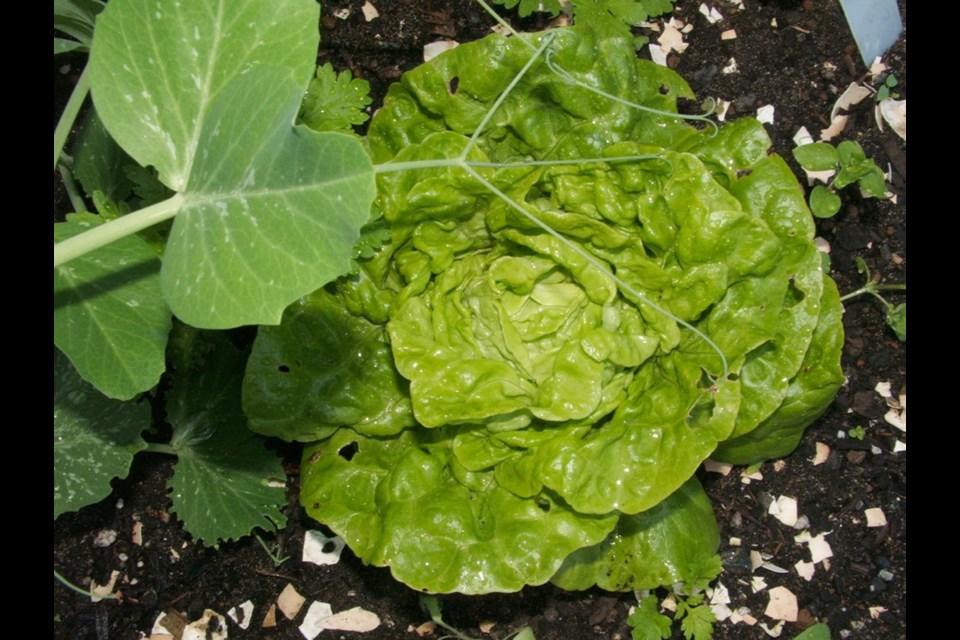Can you hear them out there, exulting as they wallow in the wet? Slugs, everywhere — under every leaf and rock, in the lettuce. Temperatures and moisture levels these past few months have been ideal for slug egg laying and a mass production of babies.
This spring’s slug population explosion has prompted me to thumb through a booklet on west coast slugs, with the intention of viewing the current “infestation” in perspective.
I’ve never minded commonplace populations of slugs in the garden. They’re part of the whole gardening scene after all, and they play an important role in breaking down decaying plant matter.
Slugs have a certain fascination too. With its protective coating of water-absorbing mucus (slime), a slug is able to safely slide along the edge of a razor blade or cross crushed glass.
Slugs are remarkably strong. Their bodies, inside and out, are densely equipped with sensory receptors. Their courtship and mating rituals are prolonged and impressive.
Still, they chew large, ragged holes in leaves and can demolish seedlings. Feeding mainly at night, slugs are most active in cool, wet weather. Soon, drier conditions and warmer temperatures will slow their activity. Meanwhile, here are a few safe, non-toxic ways of dealing with unacceptable populations.
• Protect predators. To maintain a healthy ecological balance in gardens, protect pest predators, first by refraining from the use of pesticides, which harm beneficial insects. Ground beetles, centipedes and rove beetles feed on slugs. More than once I’ve seen a garter snake with a slug in its mouth.
• Eggs. Watch for clusters of round, translucent eggs in the soil and in damp, protected places like under rocks. Destroy them.
• Traps. Commercial slug traps are available. Beer traps are easily made. Cut holes or squares at least 2.5 cm wide immediately beneath the rims of cottage cheese or similar containers. Fill three-quarters full of stale beer. Replace the lids and position the containers with the holes just above the soil surface.
• Hand pick. Go on a slug hunt early in the morning or in the evening. Drop the slugs in a jar or pail of soapy water. In the morning collect slugs from underneath boards, overturned grapefruit halves or flower pots, wet newspaper or sheets of plastic that have been placed on the ground overnight.
• Nix the salt. Please do not use salt to dehydrate slugs. The many nerve endings on a slug’s body will mean a painful death. Also, numerous applications of salt will render the soil toxic.
• Baits. Non-toxic iron-based baits containing an attractant cause slugs and snails to stop feeding.
Slugs, lettuce, fathers and families. Whenever my father wanted to express anyone’s liking for something, he would say the person was attracted “like slugs to lettuce.”
I think of his words when I harvest a head of lettuce and notice one or two little slugs in among the leaves. To clean a lettuce, I give it a rinse, then soak it in tepid water to loosen unwanted bits before rinsing it again in cold water.
We’ll be marking the official beginning of summer today and honouring our fathers this weekend. I never met or knew much about my father’s family, except for one sister, Aunt Brodie, who visited us once. Only recently, an email from a column reader sent me delving into a couple of family letters I’d been given years ago and put away. The reader wanted to know whether I’m related to an Aileen Chesnut, a person he knew as a child in Ontario.
In one of the letters Aunt Brodie described some of the family history. Aileen was my father’s eldest sister. Brodie’s unusual first name was her mother’s (my grandmother’s) surname. Her maternal grandfather (my great-grandfather) Brodie had a brother who was knighted by Queen Victoria and was a famous surgeon. Gray’s Anatomy is dedicated to him — Sir Benjamin Collins Brodie.
To fathers, and all who care for others and for this Earth we live on, I wish a splendid Father’s Day weekend. For the many who have turned to food gardening, know that you are doing something fundamentally significant. You are feeding your family, nurturing their health, and stewarding the little patch of earth under your temporary care.



